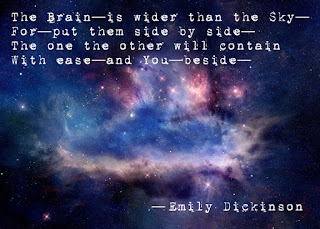In
the second week there was a task of writing assignment-1, there were four poems
and we have to choose any one for our assignment writing. I have selected “The
Brain — is wider than the Sky (632) by Emily Dickinson”. There are some
rules of writing assignments.
# We have to include full text
of selected poem
# The words limit is 500 words.
# We have to review other classmate’s
(fellow learner’s) assignments.
and they clearly instruct that
the content and explanation is more important rather than grammar and use of
language, because it may possible that all learners have not English as their
native language; their supportive approach towards all learners is good.
Click on the below image for information about all weeks:
Emily Dickenson is an intensive poet and she
contains deep concentration about her statements in her poems. Here I have
tried to explain her poetry,
“The Brain — is wider than the Sky (632) by
Emily Dickinson”
The Brain—is wider than the Sky—
For—put them side by side—
The one the other will contain
With ease—and You—beside—
The Brain is deeper than the sea—
For—hold them—Blue to Blue—
The one the other will absorb—
As
Sponges—Buckets—do—
The Brain is just the weight of God—
For—Heft them—Pound for Pound—
And they will differ—if they do—
As Syllable from Sound—
In the next stanza, Brain is compared with sea, “The Brain is deeper than the sea”. The sea contains various elements in it, and if we look towards sea as an archetypal symbol it symbolizes tragedy and death, here we can take sea as experiences of human life and brain is “deeper” than sea which suggests brain contains lots of experience which is bad and good. One can measure the deepness of sea but not of mind.
In the last stanza, brain is compared with the weight of God; here the capitalization in ‘Brain’ and ‘God’ suggests equal value of both. Human mind contains variety of interpretations towards God and all that interpretations have emerged from mind. Poet is not directly compares brain with God but the comparison is with weight of both, God has created world and in the same way brain can also create its own world, the capability of both is same but as poet says, “and they will differ” and the difference has metaphorically presented as the difference of ‘sound’ and ‘syllable’. Sound is something natural and very much pure but syllable is human created or we can say made by man, so in the last stanza Emily Dickinson gives importance to nature and put a statement that the world which human can create is artificial and materialistic.
The use of words like “side by side” in the first stanza can be seen as a physical difference of the sky in our mind and the real sky, in second stanza there is “blue to blue”, if we observe sea it looks blue but actually it the reflection of sky so the what our mind observes is blue color, and “pound for pound” can be defined as the weight is same but the qualities are different.
After reading the whole poem and interpretation, the conclusion could be negative as well as positive, the end is open but complex.
Form of Poem: this poem also contains Emily Dickinson's pattern of writing, with dash and capitalization. this poem contains iambic meter with tetrameter in first and third line of every stanza and ABAB rhyme scheme is there in every stanza.
After
submitting the assignment, our classmates review the assignment and give points.
In the below screenshot there are some reviews by learners.


No comments:
Post a Comment